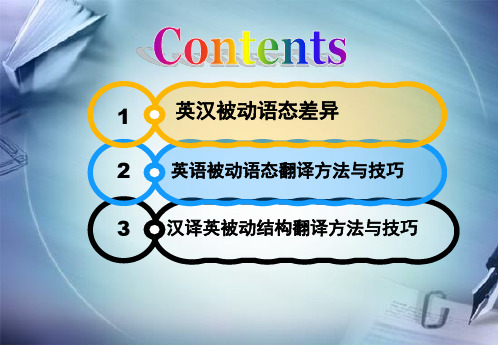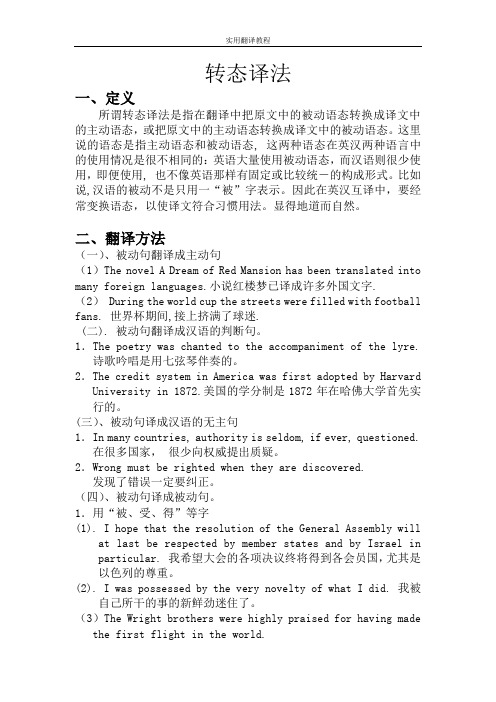语态转换译法
英语学习4语态转换译法

课堂互动1: 翻译下 列句子, 顺译成被动 句(参考译文)
1.Those who perform deeds of merit will be rewarded.
【译文】立功的人将受到奖励。
2.A program called a compiler (汇编者) was written by an expert in machine code and is stored in the computer.
His plain prose is enlivened (使活跃) by boundless curiosity, a very sense of humour and a falcon-sharp eye for detail.
The temperature of the earth is determined by the amount of solar heat which the atmosphere can keep.
○ 【译文】左耳是由大脑的右侧控制的。
课堂互动2: 翻译下 列句子, 顺译成主动句 (参考译文)
1.This is a question to be answered at once.
【译文】这是一个要立即回答的问题。
2.We are deeply touched by the hero’s loyalty to the cause.
一四.1. 2 顺译成主动句
顺译成形式是主动,意义上是被动的句子
例1:Love can not be forced.
○ 【译文】爱情不能强求。
例2:Love and cough cannot be hidden.
语态转换译法

•
(Charlotte Brontë: Jane Eyre)
• 【译文】她以为一切都是公正合法的,做梦也没 想到过自己竟会被诱入欺诈婚姻的圈套,跟一个 骗子、疯子、十足的坏蛋缔结姻缘。
B. 译成 “挨” 字句
• “挨”仅用于翻译该动作是对动作接受者( 受事者)不利或不好的句子。
• 例1:The boy was criticized yesterday. • 【译文】这孩子昨天挨了一顿批评。 • 例2:I was caught in the downpour. • 【译文】我在大雨中挨浇了。 •
• 【译文】这件事必须在适当的时候用适当 的手段予以处理。
课堂互动1: 翻译句子, 顺译成被动句
• 1.Those who perform deeds of merit will be • rewarded. • 2.Translation technique should be paid enough • attention to. • 3.The temperature of the earth is determined by the • amount of solar heat which the atmosphere can • keep. • 4.His father was killed before liberation. • 5.With a true democratic system, he said, Egypt • would not have been defeated by Israel in Nhomakorabea1967.
• 例1:Love can not be forced. • 【译文】爱情不能强求。 • 例2:Love and cough cannot be hidden. • 【译文】爱情和咳嗽都无法隐藏。
语态变换法

语态变换法这里说的语态是指主动语态和被动语态。
这两种语态在英汉两种语言中的使用情况是很不相同的:英语大量使用被动语态,而汉语则很少使用,即便使用,也不像英语那样有固定或比较统一的构成形式。
譬如说,汉语的被动不是只用一个“被”字表示。
因此在英汉互译中,要经常变换语态,以使译文符合习惯用法,显得地道而自然。
试看译例:1.The coming physics examination is said to be rather difficult,so we must get well prepared for it.即将举行的物理考试据说相当困难,所以我们必须做好充分准备。
2.If bad weather is expected, the forecaster must be able to suggest another airport within the range of the aircraft where the weather will be suitable for landing.如果预计天气恶劣,天气预报人员必须能够在该飞机航程内提出另一个天气适合着陆的机场。
3.How can a series of motionless,or still,pictures be blended on a screen to produce motion pictures?一组不动的即静止的图片是怎样在银幕上连到一起合成电影的呢?4.Such liquid fuel rockets as are now being used for space research have to carry their own supply of oxygen.像现在用于宇宙研究的这类液态燃料火箭,必须自己携带氧气。
5.How long will it be before black and white television sets are found only in museums?还要过多久黑白电视机才会被送进博物馆呢?6.The oil of the world will have been used up,and man will be using the more convenient power obtained from the splitting of the atom.全世界的石油将会用尽,人们将使用从原子分裂获得的这种更为方便的动力。
英语学习4语态转换译法-精选文档

7.The temperature of the earth is determined by the amount of solar heat which the atmosphere can keep.
例1:You have been wetted in the rain.
【译文】你叫雨淋湿了。
例2:The γ-rays are not affected by an electric field.
【译文】γ射线不受电es and buildings, roads and bridges were
14. 1. 1 顺译成被动句 A.译成 “被” 字句 例1:Vitamin C is destroyed when it is overheated. 【译文】 维生素C受热过度就会被破坏。
B. 译成 “挨” 字句
“挨”仅用于翻译该动作是对动作接受者 (受事者)不利或不好的句子。 例1:The boy was criticized yesterday.
damaged in the seaquake.
【译文】许多房屋建筑、道路桥梁在这次海啸 中遭到破坏。
例4:It must be dealt with at the appropriate time with appropriate means.
【译文】这件事必须在适当的时候用适当的手 段予以处理。
【译文】被谈过话的申请人,要求交上必要的材
料。
5.Television keeps us informed about current events at home and abroad.
【翻译技巧】英语笔译句法——转态译法

【翻译技巧】英语笔译技法——转态译法所谓转态译法,就是在翻译过程中把原文的被动语态(主动语态)转换成译文的主动语态(被动语态)。
我们知道,英语更惯用被动语态,而汉语更多用主动语态。
因此,在英译中时,通常将英语原文的被动语态转换成汉语译文的主动语态;而在中译英时,则将汉语原文的主动语态转换成英语译文的被动语态。
科技英语是使用被动语态最为频繁的一种文体,不仅有语言结构上的原因,也有一定的语义价值。
科技英语总是把事物的名称作为主语放在突出的位置,用被动语态表述相关的动作或状态,有利于突出表述的客观事实,结构简练。
汉语则惯用主动语态,大量使用无主语、形式主语、意义被动的句子以及判断句等。
此外,汉语中使用的被动语态也不仅限于“被”字,还包括“挨”、“给”、“让”、“受”、、“遭到”、“为…所”、“经…所”等大量被动含义的词,其形式更多样化和随意化,不像英语那样有固定或比较统一的构成形式。
一、英译汉中的转态译法1、英语被动句译成汉语主动句(最常见)(1)原文主语在译文中仍作主语①根据原文语序直接顺译成主动句(将动词改为主动态),译文虽为主动句但意义是被动的The news was passed on very soon.消息很快传开了。
The enemy’s plot was exposed.敌人的阴谋暴露了。
This plan is good,but can still be improved.这计划不错,但还可以改进。
②译成“是…的”结构,强调施事者,译文意义是被动的That ridiculous idea was put forward by his brother.这个怪念头是他哥哥想出来的。
The credit system in Amer i ca was first adopted by Harvard University in1872.美国的学分制是1872年在哈佛大学首先实施的。
③改变原文的谓语动词,译句的意义是主动的The teacher was satisfied with the answer.老师对回答感到满意。
翻译技巧-语态转换译法ppt课件

返回章重点 退出
1、英汉被动语态差异
1、关于这个问题,已经说得很多了。 2、对这一问题迄今尚未进行过彻底的探索。
1. Much has been said on this question. 2. The issue has not yet been thoroughly explored.
4
返回章重点 退出
14
返回章重点 退出
2. 2 译成主动句 B. 添加主语
一些英语被动句并未出现动作施事者,汉译时可适 当增添不确定的主语,如“人们”、“有人”、“大家”、 “我们”等;或改变句中其他成分做主语。
1)My holidays afternoons were spent in ramble about the surrounding country.
【译文】有人指出人体内不同种类的蛋白质可多达10万种。 2)It is generally considered that it is not advisable to act that way. 【译文】大家认为这样做是不妥当的。
30
返回章重点 退出
2. 5. 1 “It + be + V-ed + that... ”结构
(谓语分译)
13
返回章重点 退出
2. 2 译成主动句
A. 保持原主语不变 1)Love can not be forced.
【译文】爱情不能强求。
2)Illness must be correctly diagnosed before they can be treated with medicine. 【译文】疾病必须先确诊,再用药。
5
返回章重点 退出
1、英汉被动语态差异
转态译法

转态译法一、定义所谓转态译法是指在翻译中把原文中的被动语态转换成译文中的主动语态,或把原文中的主动语态转换成译文中的被动语态。
这里说的语态是指主动语态和被动语态, 这两种语态在英汉两种语言中的使用情况是很不相同的:英语大量使用被动语态,而汉语则很少使用,即便使用, 也不像英语那样有固定或比较统-的构成形式。
比如说,汉语的被动不是只用一“被”字表示。
因此在英汉互译中,要经常变换语态,以使译文符合习惯用法。
显得地道而自然。
二、翻译方法(一)、被动句翻译成主动句(1)The novel A Dream of Red Mansion has been translated into many foreign languages.小说红楼梦已译成许多外国文字.(2) During the world cup the streets were filled with football fans. 世界杯期间,接上挤满了球迷.(二). 被动句翻译成汉语的判断句。
1.The poetry was chanted to the accompaniment of the lyre.诗歌吟唱是用七弦琴伴奏的。
2.The credit system in America was first adopted by Harvard University in 1872.美国的学分制是1872年在哈佛大学首先实行的。
(三)、被动句译成汉语的无主句1.In many countries, authority is seldom, if ever, questioned.在很多国家,很少向权威提出质疑。
2.Wrong must be righted when they are discovered.发现了错误一定要纠正。
(四)、被动句译成被动句。
1.用“被、受、得”等字(1). I hope that the resolution of the General Assembly willat last be respected by member states and by Israel in particular. 我希望大会的各项决议终将得到各会员国,尤其是以色列的尊重。
Unit Eight Conversion of Voices

In-Class Drill
• Translate the following sentences into English. • 1.那时和谈正在巴黎进行。 • 2.烈火立刻把他包围了。
4.为了加强上下文的连贯性,而要将原汉语 主动式变为被动式。
①她出现在台上,观众给予热烈鼓掌。 译文:She appeared on the stage and was warmly applauded by the audience. ②口试时,问了十个问题,她全都答对了。 译文:She was asked ten questions in the oral exam and answered every one of them correctly.
Unit Eight
语态转化译法 (Reversing Voice)
语态变换译法是指在翻译过程中把原文中的 被动语态转换成译文中的主动语态,或把原文的 主动语态转换成译文中的被动语态。 一般而言,无论是书面语中还是口语中, 英语比汉语用更多的被动语态。在汉译英过程中, 一些汉语中的主动语态句式可以根据具体情况而 变为被动语态。
3. The arms race must be stopped.
4. This article needs further polishing/to be further polished.
英语中使用被动语态的情况有:
①着重被动的动作;
②突出动作承受者(人或事)的重要性; ③不知道或无须说出施动者; ④便利上下文的连贯、衔接。
1.本身就带有被动标记如“被”、“由”、 “遭”、“给”、“挨”、“叫”、“让” 等的汉语被动句式译成英文时一般也应保 持被动式。
①海外华侨现在不再被人轻视了。 译文:Overseas Chinese are no longer looked down upon. ②他被选为学生会主席。 译文:He was elected Chairman of the Students’ Union.
- 1、下载文档前请自行甄别文档内容的完整性,平台不提供额外的编辑、内容补充、找答案等附加服务。
- 2、"仅部分预览"的文档,不可在线预览部分如存在完整性等问题,可反馈申请退款(可完整预览的文档不适用该条件!)。
- 3、如文档侵犯您的权益,请联系客服反馈,我们会尽快为您处理(人工客服工作时间:9:00-18:30)。
• 例1:Vitamin C is destroyed when it is overheated. • 【译文】 维生素C受热过度就会被破坏。 • 例2:Once the flower has been pollinated and fertilized, the plant provides the newly formed seeds with a reserve of food materials, which will be needed when they themselves germinate. • 【译文】花一旦被授了粉并受了精,植株就会对 新生种子提供养料贮藏,以备种子未来发芽之需。
语态转换译法指主动语态和被动语态
的互译,即把英语的被动语态的句子转译
成汉语的主动语态的句子, 或把英语的主动
语态的句子转译成汉语的被动语态的句子,
使译文显得地道自然,符合汉语习惯。语
态转换译法是一种十分常见的翻译方法和
技巧。
ห้องสมุดไป่ตู้
8. 1 顺译法 (Translation in Original Order)
• 例3:My holidays afternoons were spent in ramble about the surrounding country. (Washington Irving) • 【译文】每逢假日的下午,我总要漫步周 围的乡村。 • 例4:Illness must be correctly diagnosed before they can be treated with medicine. • 【译文】疾病必须先确诊,再用药。
译文欣赏
• • • • • 1. 立功的人将受到奖励。 2. 翻译技巧应予以足够的重视。 3. 地球的温度取决于大气能保持多少热辐射。 4. 他爹在解放前给杀害了。 5. 他说倘有一个真正的民主制度,埃及就不会 在1967年让(被)以色列打败了。
8. 1. 2 顺译成主动句
A. 顺译成形式是主动,意义是被动的句子 把英语句子顺译成主动句,其形式是主动,但 从意义和逻辑关系上看还是被动句。 • 例1:Love can not be forced. • 【译文】爱情不能强求。 • 例2:Love and cough cannot be hidden. • 【译文】爱情和咳嗽都无法隐藏。
课堂互动1: 翻译句子, 顺译成被动句
• • • • • • • • • • 1.Those who perform deeds of merit will be rewarded. 2.Translation technique should be paid enough attention to. 3.The temperature of the earth is determined by the amount of solar heat which the atmosphere can keep. 4.His father was killed before liberation. 5.With a true democratic system, he said, Egypt would not have been defeated by Israel in 1967.
B. 改变原文的谓语动词,顺译成主动句
如果把英语的被动句译成汉语的被动句,则不符合汉语的 语言习惯,所以常可将英语的被动句顺译成汉语的主动句, 原文的谓语动词是被动形式,可转变谓语,顺译成汉语的 主动形式。 例1:The teacher was satisfied with the answer. 【译文】老师对回答感到满意。 例2:I am told you are careless. 【译文】听说你很粗心大意。 例3:The long river is originated from that high mountain. 【译文】这条大河发源于那座山。
• 例3:She thought all was fair and legal, and never dreamt she was going to be entrapped into a feigned union with a defrauded wretched, already bound to a bad, mad, and imbruted partner! • (Charlotte Brontë: Jane Eyre) • 【译文】她以为一切都是公正合法的,做梦也没 想到过自己竟会被诱入欺诈婚姻的圈套,跟一个 骗子、疯子、十足的坏蛋缔结姻缘。
• 例3:A lot of houses and buildings, roads and bridges were damaged in the seaquake. • 【译文】许多房屋建筑、道路桥梁在这次 海啸中遭到破坏。 • 例4:It must be dealt with at the appropriate time with appropriate means. • 【译文】这件事必须在适当的时候用适当 的手段予以处理。
C. 译成 “叫、让、由、受、遭到、受到、 予、予以、加、加以、引以、为……所、 经……所” 等字句,用以加强说话、表达 语气。
• 例1:You have been wetted in the rain. • 【译文】你叫雨淋湿了。 • 例2:The γ-rays are not affected by an electric field. • 【译文】γ射线不受电场影响。
B. 译成 “挨” 字句
• “挨”仅用于翻译该动作是对动作接受者 (受事者)不利或不好的句子。 • 例1:The boy was criticized yesterday. • 【译文】这孩子昨天挨了一顿批评。 • 例2:I was caught in the downpour. • 【译文】我在大雨中挨浇了。 •
• 既保留原文的主语,又要使译文主要成分的顺序 和原文大体一致的翻译方法就叫顺译法。 8. 1. 1 顺译成被动句 A. 译成 “被” 字句 所谓“被”字句,就是在汉语的动词前面加上一 个“被”字来表示被动的句子。主要表示这个动 作不利于受事者或这个情况有点特殊,或者出乎 意料。加上“被”字以引起读者的注意。
